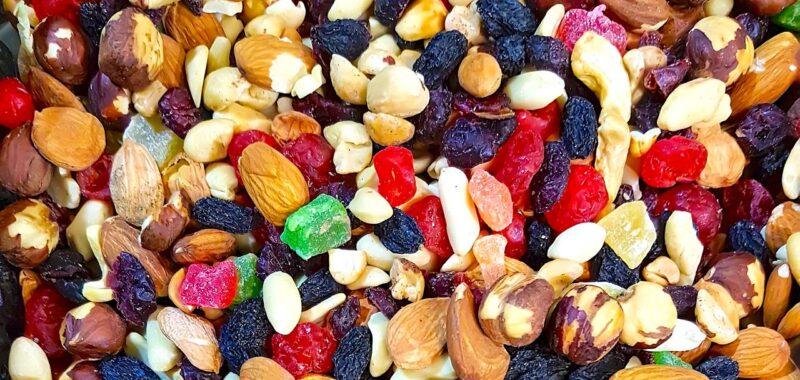Technically, the best time to eat dried fruit and nuts is whenever you feel like it. That’s a given. However, there are certain times of day that the healthy fats and natural sugars can benefit you optimally. Will that handful of raisins you reached for between Zoom calls be better suited for breakfast? Are a small cup of almonds best at bedtime or during that mid-afternoon slump? Can blending dates and walnuts into a smoothie have benefits besides tasting really good?
While dried fruits and nuts are nutrient-dense powerhouses, they’re not a one-size-fits-all fix. Their benefits shift depending on when—and why—you eat them. The same dish of dried apricots that perk you up at 10 a.m.might weigh you down at 10 p.m.
So when is the best time to eat dried fruits and nuts? And does it really matter whether you pop those pistachios before a workout or after a nap? According to experts, the answer is yes. The timing can affect everything from energy and digestion to blood sugar and sleep quality.
The issue lies in the timing rather than the food. Here’s when to eat them, what to pair them with, and how to make them work harder for your body—without turning snack time into science class. Experts break through the noise to give us the facts.
The best time to have dry fruits and nuts
“Dried fruit and nuts are best eaten when the body is primed to absorb nutrients. They are potent foods—treat them with intention, and your body will thank you,” says Dr Rhea Mehta (PHD), bio-toxicologist, nutrition scientist, and integrative health coach at The White Door spa. In other words, it’s all about matching your consumption to your needs.
Get the mix right
Hormones, metabolism, digestive capacity, blood sugar, and activity levels all play a role. Active individuals are better able to utilize natural sugars and fats post-exercise. In contrast, more sedentary folks are better off consuming smaller amounts earlier in the day to avoid fat storage.
“Dried fruit has a higher glycemic load and should be eaten in moderation, preferably in the morning or pre-workout. In comparison, nuts have a low glycemic index and can be eaten anytime to stabilise blood sugar and prevent crashes,” says certified nutrition coach and holistic wellness expert Payal Rangar.
Health conditions also shape the rules. Sports nutritionist Nicole Linhares Kedia suggests iron-rich soaked raisins in the morning for those dealing with heavy periods. For PMS relief, magnesium-rich pumpkin seeds, almonds, or walnuts stirred into dinner-time soups can help.
“Eating nuts before a high-carb meal can reduce a blood sugar spike post meal, especially in people with diabetes or PCOS. It works because nuts are rich in fibre, healthy fats, and protein, which delay the digestion of carbohydrates,” adds Kedia.
Time it according to your goal
Energy boost
Morning, afternoon, and pre-workout all work well in this case. “Almonds and walnuts provide steady energy in the morning, while dates and pistachios are perfect before your workout for a quick energy boost. Cashews and raisins give you a mental boost to beat the afternoon slump,” says Rangar. Similarly, she advises having dates, raisins, apricots, and figs for quick energy and almonds, walnuts, and cashews, which are rich in healthy fats and protein, for prolonged stamina.

